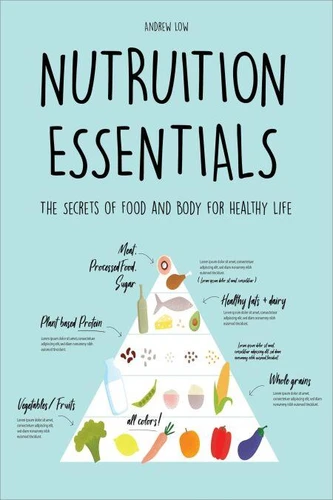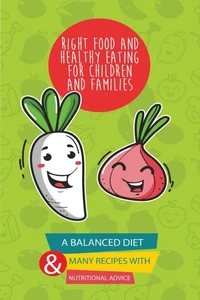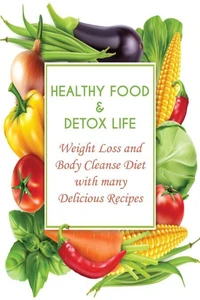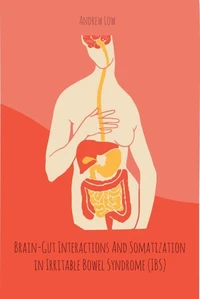Nutrition Essentials The Secrets of Food and Body for Healthy Life
Par :Formats :
Disponible dans votre compte client Decitre ou Furet du Nord dès validation de votre commande. Le format ePub est :
- Compatible avec une lecture sur My Vivlio (smartphone, tablette, ordinateur)
- Compatible avec une lecture sur liseuses Vivlio
- Pour les liseuses autres que Vivlio, vous devez utiliser le logiciel Adobe Digital Edition. Non compatible avec la lecture sur les liseuses Kindle, Remarkable et Sony
 , qui est-ce ?
, qui est-ce ?Notre partenaire de plateforme de lecture numérique où vous retrouverez l'ensemble de vos ebooks gratuitement
Pour en savoir plus sur nos ebooks, consultez notre aide en ligne ici
- FormatePub
- ISBN8201625962
- EAN9798201625962
- Date de parution19/09/2021
- Protection num.pas de protection
- Infos supplémentairesepub
- ÉditeurJL
Résumé
The foods you eat have significant effects on your health and quality of life. Although eating healthy can be pretty straightforward, the rise in popular "diets" and dieting trends has caused confusion. In fact, these trends often distract from the most critical basic nutrition principles. This is a detailed beginner's guide to healthy eating, based on the latest in nutrition science. Research continues to link serious diseases to a poor diet.
For example, eating healthy can drastically reduce your chances of developing heart disease and cancer, the world's leading killers. A good diet can improve all aspects of life, from brain function to physical performance. In fact, food affects all your cells and organs. In recent years, the importance of calories has been pushed aside. While calorie counting isn't always necessary, total calorie intake still plays a crucial role in weight control and health.
If you put in more calories than you burn, you will store them as new muscle or body fat. If you consume fewer calories than you burn every day, you will lose weight. If you want to lose weight, you must create some form of calorie deficit. In contrast, if you are trying to gain weight and increase muscle mass, you need to eat more than your body burns. If you participate in exercise or sports, there is no doubt that a healthy diet will help you perform better.
You should aim to consume whole foods at least 80-90% of the time. The term "whole foods" generally describes natural, unprocessed foods containing only one ingredient. If the product looks like it was made in a factory, it's probably not whole food. Whole foods tend to be nutrient-dense and have a lower energy density. This means that they have fewer calories and more nutrients per serving than processed foods.
In contrast, many processed foods have little nutritional value and are often "empty" calories. Eating them in large amounts is linked to obesity and other diseases.
For example, eating healthy can drastically reduce your chances of developing heart disease and cancer, the world's leading killers. A good diet can improve all aspects of life, from brain function to physical performance. In fact, food affects all your cells and organs. In recent years, the importance of calories has been pushed aside. While calorie counting isn't always necessary, total calorie intake still plays a crucial role in weight control and health.
If you put in more calories than you burn, you will store them as new muscle or body fat. If you consume fewer calories than you burn every day, you will lose weight. If you want to lose weight, you must create some form of calorie deficit. In contrast, if you are trying to gain weight and increase muscle mass, you need to eat more than your body burns. If you participate in exercise or sports, there is no doubt that a healthy diet will help you perform better.
You should aim to consume whole foods at least 80-90% of the time. The term "whole foods" generally describes natural, unprocessed foods containing only one ingredient. If the product looks like it was made in a factory, it's probably not whole food. Whole foods tend to be nutrient-dense and have a lower energy density. This means that they have fewer calories and more nutrients per serving than processed foods.
In contrast, many processed foods have little nutritional value and are often "empty" calories. Eating them in large amounts is linked to obesity and other diseases.
The foods you eat have significant effects on your health and quality of life. Although eating healthy can be pretty straightforward, the rise in popular "diets" and dieting trends has caused confusion. In fact, these trends often distract from the most critical basic nutrition principles. This is a detailed beginner's guide to healthy eating, based on the latest in nutrition science. Research continues to link serious diseases to a poor diet.
For example, eating healthy can drastically reduce your chances of developing heart disease and cancer, the world's leading killers. A good diet can improve all aspects of life, from brain function to physical performance. In fact, food affects all your cells and organs. In recent years, the importance of calories has been pushed aside. While calorie counting isn't always necessary, total calorie intake still plays a crucial role in weight control and health.
If you put in more calories than you burn, you will store them as new muscle or body fat. If you consume fewer calories than you burn every day, you will lose weight. If you want to lose weight, you must create some form of calorie deficit. In contrast, if you are trying to gain weight and increase muscle mass, you need to eat more than your body burns. If you participate in exercise or sports, there is no doubt that a healthy diet will help you perform better.
You should aim to consume whole foods at least 80-90% of the time. The term "whole foods" generally describes natural, unprocessed foods containing only one ingredient. If the product looks like it was made in a factory, it's probably not whole food. Whole foods tend to be nutrient-dense and have a lower energy density. This means that they have fewer calories and more nutrients per serving than processed foods.
In contrast, many processed foods have little nutritional value and are often "empty" calories. Eating them in large amounts is linked to obesity and other diseases.
For example, eating healthy can drastically reduce your chances of developing heart disease and cancer, the world's leading killers. A good diet can improve all aspects of life, from brain function to physical performance. In fact, food affects all your cells and organs. In recent years, the importance of calories has been pushed aside. While calorie counting isn't always necessary, total calorie intake still plays a crucial role in weight control and health.
If you put in more calories than you burn, you will store them as new muscle or body fat. If you consume fewer calories than you burn every day, you will lose weight. If you want to lose weight, you must create some form of calorie deficit. In contrast, if you are trying to gain weight and increase muscle mass, you need to eat more than your body burns. If you participate in exercise or sports, there is no doubt that a healthy diet will help you perform better.
You should aim to consume whole foods at least 80-90% of the time. The term "whole foods" generally describes natural, unprocessed foods containing only one ingredient. If the product looks like it was made in a factory, it's probably not whole food. Whole foods tend to be nutrient-dense and have a lower energy density. This means that they have fewer calories and more nutrients per serving than processed foods.
In contrast, many processed foods have little nutritional value and are often "empty" calories. Eating them in large amounts is linked to obesity and other diseases.








